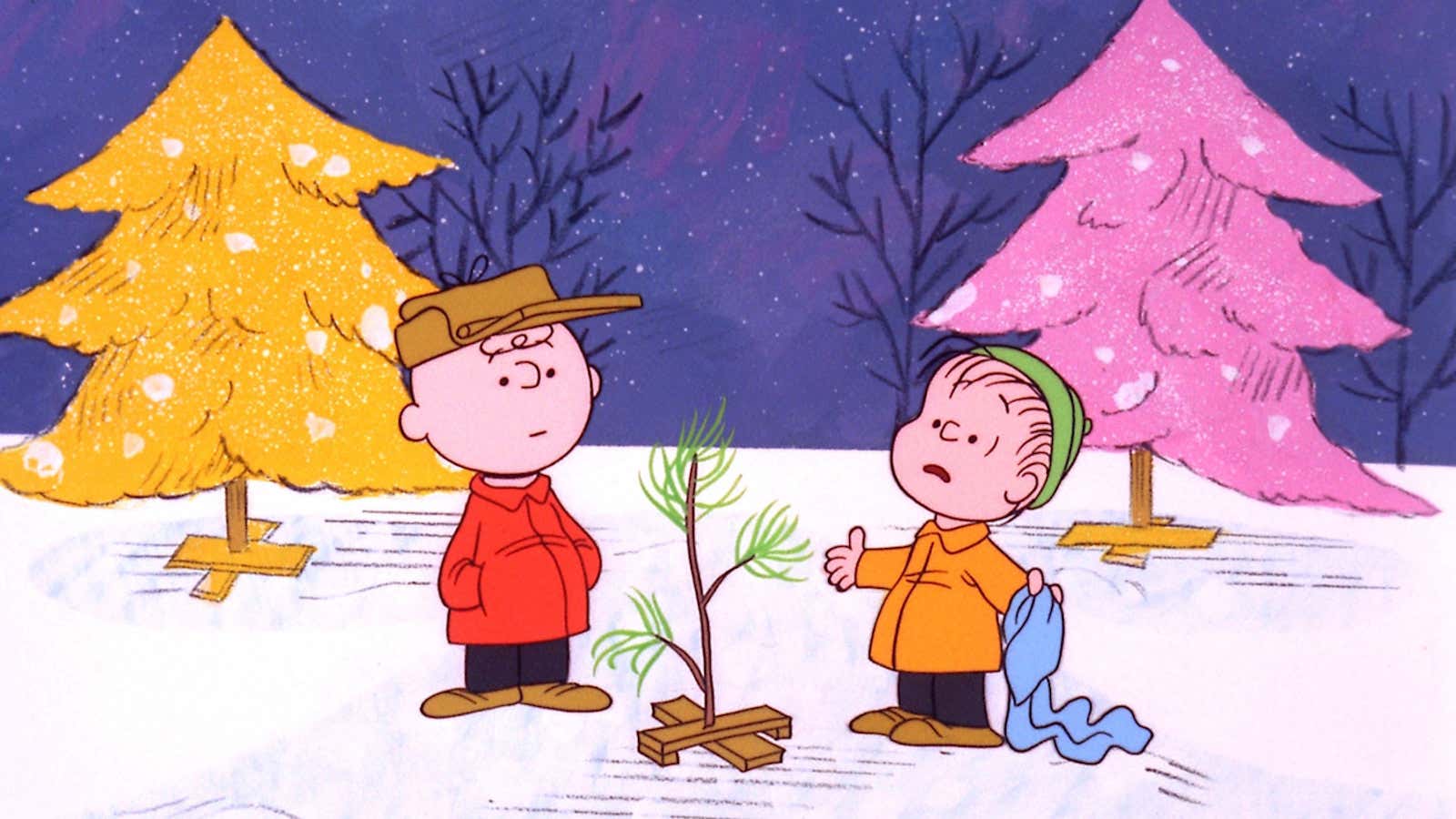“Christmas is coming, and I’m not happy. I don’t feel the way I’m supposed to feel.”
That line, spoken by Charlie Brown to Linus, sets the tone for the unconventional holiday film A Charlie Brown Christmas. Originally uttered in 1965, its ennui-filled sentiment is shared, over 50 years later, by many Americans following the recent US presidential election.
The 43-minute animated movie pulls no punches. The film follows Charlie Brown, who is having trouble making the seemingly logical leap between the humble birth of Christ and the commercial fracas that occupies the weeks between Thanksgiving and Christmas. (The fact that the film was sponsored by Coca Cola is an amusing irony.) If Christmas is just an excuse for conspicuous consumption and its resulting woes, why bother celebrating Christmas at all?
At the time, the film delivered a gut punch to rampant consumerism, exposing its potential to undermine sacred practices. But viewed through lens of Donald Trump’s upcoming inauguration, Charlie’s spiritual languor is entirely relatable in 2016. After all, in the church of the democratic republic, Election Day is as sacrosanct as Christmas.
Feeling disenfranchised from the democracy we’re supposed to adore, left-leaning voters have been left to question what the point of politics really is, just as Charlie does with the holiest of days. Take the moment when Charlie goes to Lucy’s psychiatric help stand to find clarity on the season, for example.
After receiving her payment upfront, Lucy can only offer to label Charlie’s problem without providing a real solution to his seasonal blues. She’s more interested in her endgame—money—than his endgame—happiness.
In the world of 2016, the average liberal is Charlie Brown—and the media is the unhelpful Lucy. Eager for explanations, desperate constituents turned to the media to help them center their thoughts and cut through the foggy haze of deceit. But in the end, publications’ partisanship only produced more smoke and mirrors for the reader. Lucy’s focus on her bottom line shows how institutions like the media can fall victim to the subversion of self-interest—and how us Charlie Browns often look to the wrong places for answers.
Charlie’s sister, Sally, also shares Lucy’s money-hungry perspective. After speaking with Lucy, Charlie helps his sister write her Christmas list. The list begins with pleasantries and devolves into the throes of avarice—Sally even offers to make Santa’s job easier by just asking for a pile of cash. Charlie storms off in dismay, upset that his own sister has been indoctrinated by the commercialism of the season.
Sally has developed the perception that gifts are something that she is owed because it is the holiday season, not for any religious sentiment. This sense of entitlement could also be read from the perspective of those disenfranchised Americans who operate with their own self-interest at heart, ignoring the greater good of the nation as a whole. Sally is a stand-in for Trump voters who treated the election as a business transaction, throwing support to the president-elect in exchange for his fundamentally empty economic promises.
But in these dispirited times, “A Charlie Brown Christmas” may also offer a vision for the path forward. Consider the kids who vilify Charlie Brown for his directorial vision for the Christmas play. His refusal to accept the rest of the school’s commercial extravagance leads to a near mutiny. Both sides are convinced that their viewpoint is the only right one, and no amount of reasoning will convince anyone otherwise. It is just this kind of partisan divide that the US finds itself operating within in 2016.
So how was sense restored in A Charlie Brown Christmas? To stop the conflict between Charlie and the rest of the kids, Linus recants the tale of the origin of Christmas to a darkened auditorium. His telling of the nativity emphasizes the juxtaposition between the birth of Christ and the poverty he was born in to, urging the other kids to re-examine their obsession with the materialism of the season. As a result, the kids see the light and embrace Charlie’s vision for the play.
Perhaps Trump would not have won the US election if, amidst the chaos of the election season, a 21st-century Linus had come forward to warn about the dangers of partisanship—to take away all the pomp and theatrics and remind us of the fundamental dream of American democracy. It’s too late to change that now. But it’s not too late for a fresh political voice to take the public stage in 2017 and remind Americans of exactly the principles this country was founded upon. We need a true believer who can deliver a critical message: ”That’s what America is all about, Charlie Brown.”
